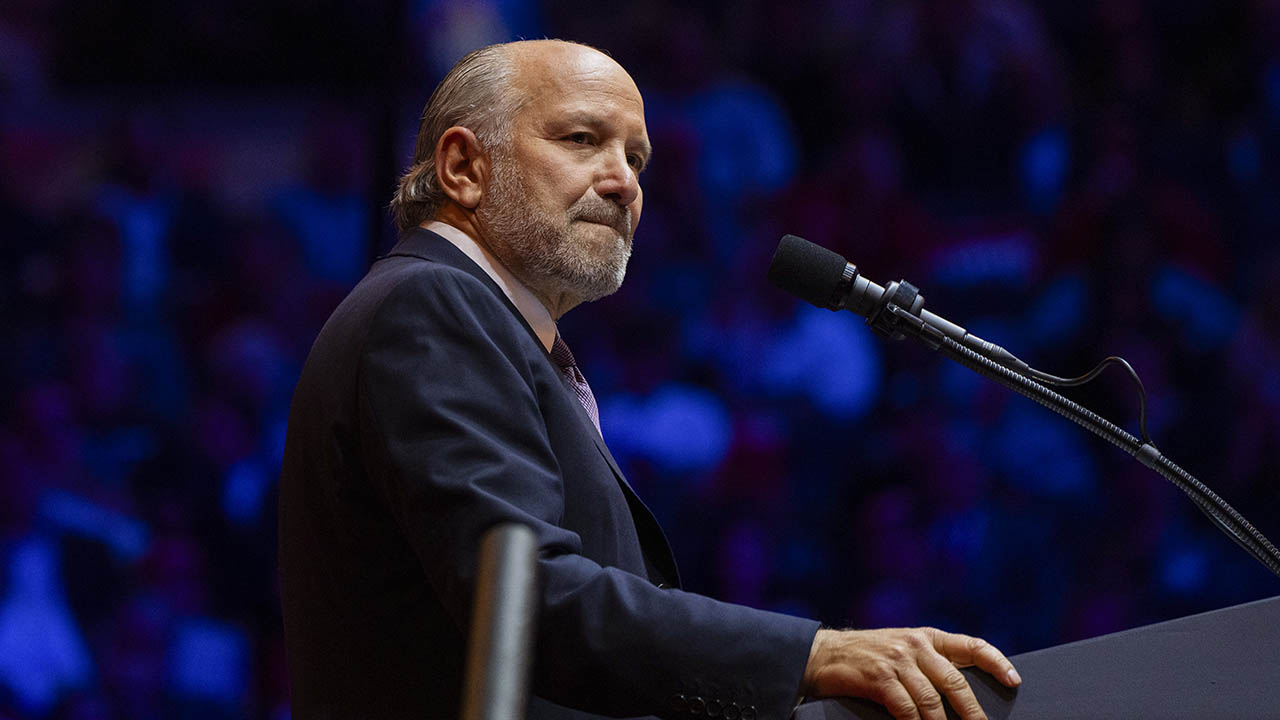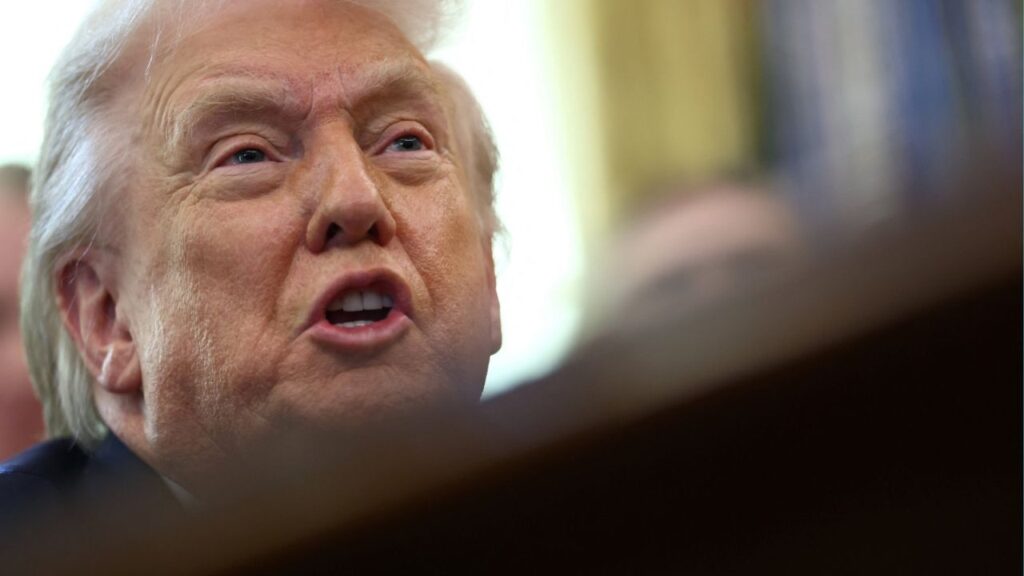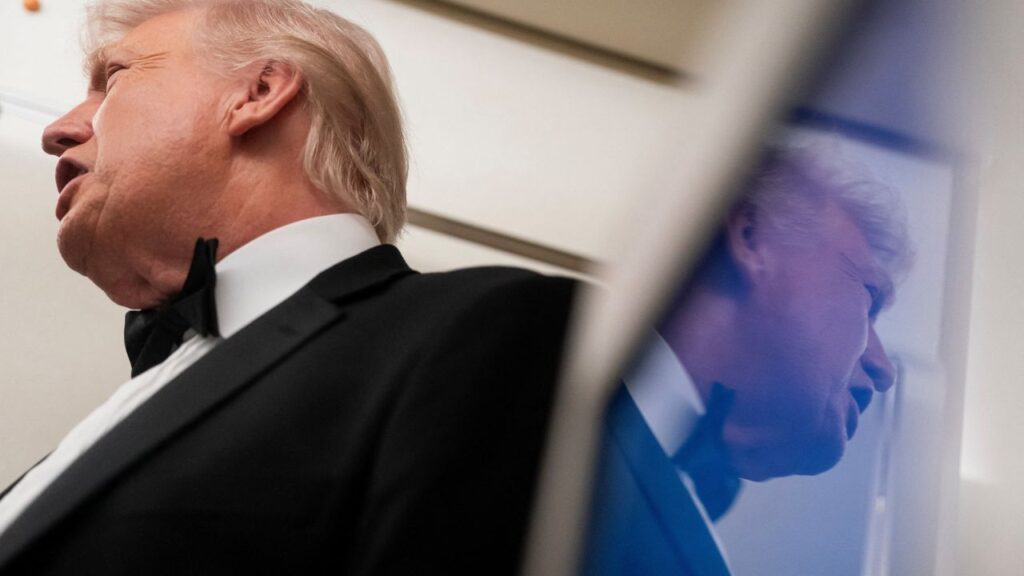FILE — Howard Lutnick speaks during a rally for former President Donald Trump at Madison Square Garden in New York, Oct. 27, 2024. In assembling his economic team for a second term, Trump has turned to a group of Wall Street executives, economists, lawyers and academics to help carry out his plans to cut taxes, impose tariffs and slash regulations. (Hiroko Masuike/The New York Times)

- Trump's new economic team brings diverse expertise from Wall Street and academia to implement his agenda.
- The advisers, mostly veterans from Trump's first term, align with his views on taxes, tariffs, and regulations.
- Key economic positions filled by loyalists who support Trump's unconventional approach to trade and fiscal policy.
Share
|
Getting your Trinity Audio player ready...
|
President-elect Donald Trump put economic policy at the center of his campaign and, in assembling his economic team, has turned to a group of Wall Street executives, economists, lawyers and academics to help carry out his plans to cut taxes, impose tariffs and slash regulations.
In contrast to his first term, when Trump installed advisers who had disparate views about areas like free trade and tariffs, the men the president-elect has selected this time around have, at least for now, professed to be in sync with his agenda.
Still, it remains to be seen how well his advisers work together and whether those with more traditionally conservative views will be willing to go along with Trump’s unconventional approach to economic policy.

Scott Bessent
A billionaire hedge fund manager, Scott Bessent made the unlikely career transition from being a donor to Democratic politicians and a top investor for George Soros to becoming Trump’s choice to lead the Treasury Department.
If confirmed, Bessent will bring broad knowledge of financial markets and the international economy to the job. In the 1990s, he gained notoriety by betting against the British pound and earning his firm, Soros Fund Management, $1 billion.
As an adviser to Trump’s campaign, Bessent promoted a 3-3-3 plan that entails increasing growth to 3%, cutting the budget deficit to 3% of gross domestic product and raising U.S. energy production by 3 million barrels of oil per day, or the equivalent in other fuels.
Related Story: Trump Can Still Vote After Sentencing, but Can’t Own a Gun and Will Have ...
Howard Lutnick
Howard Lutnick acquired a reputation as a cutthroat trader during his decades on Wall Street as CEO of Cantor Fitzgerald, a financial services company that specializes in government bonds. The firm had its offices in the World Trade Center and lost many of its traders in the Sept. 11, 2001, attack, including Lutnick’s brother.
Lutnick landed in the Commerce Department post after the more coveted position at Treasury was given to Bessent. But in a twist, Trump gave Lutnick authority over the Office of the United States Trade Representative, a separate agency that could be key to fulfilling Trump’s trade plans. Like Trump, Lutnick has advocated imposing tariffs to protect U.S. industries from foreign competition.

Jamieson Greer
As Trump’s top trade negotiator, Jamieson Greer will be responsible for facing off with other countries over trade issues. A trade litigator and former lawyer for the Air Force, Greer is the former chief of staff and a disciple of Robert E. Lighthizer, Trump’s trade representative in his first term.
In the first Trump administration, Greer was involved in trade deal negotiations with China, Canada and Mexico.

Kevin Hassett
Kevin Hassett will bring a long career of pushing for lower corporate taxes back to the White House. He served as head of the White House Council of Economic Advisers during Trump’s first term and was among many Republicans who insisted that Trump’s tax cuts would pay for themselves.
A longtime adviser to Republicans, Hassett has also counseled several presidential candidates, including Mitt Romney, George W. Bush and John McCain.
During Trump’s first term, Hassett rankled some conservative activists who were unhappy about his views favoring more immigration. He is set to again play an important role in cutting taxes and boosting economic growth for Trump as the director of the National Economic Council.
Related Story: Judge Sentences Trump in Hush Money Case but Declines to Impose Any Punishment

Russell Vought
Having served as White House budget director during Trump’s first term, Russell Vought will bring his previous experience to the Office of Management and Budget. The job is central to setting the administration’s spending priorities and determining whether federal agencies are comporting with the president’s policies.
Vought spent the last four years making plans to rework the U.S. government to enhance presidential power. He was a leading figure in Project 2025, the effort by conservative organizations to build a governing blueprint for Trump that included rolling back many federal regulations and overhauling the regulatory process.
Stephen Miran
Trump turned to the ranks of his first-term Treasury Department to find a new top economist. Stephen Miran was a senior adviser for economic policy at the Treasury Department during Trump’s first term, a role that included advising on fiscal support during the coronavirus pandemic.
Now a senior strategist at Hudson Bay Capital Management, a hedge fund, Miran has expressed strong support for Trump’s stepped-up threats of tariffs and said the president-elect had a mandate to “restructure the global trading system to make it more fair for Americans.” Miran holds a doctorate in economics from Harvard University.

Peter Navarro
By tapping Peter Navarro to be his senior counselor for trade and manufacturing, Trump has ensured there will be a staunch China hawk and true believer in tariffs in White House debates about the economy.
Navarro was a trade adviser during Trump’s first term, but he also assumed other responsibilities, including efforts to crack down on counterfeit goods sold online and to streamline the distribution of health equipment during the pandemic.
A Harvard-educated economist, Navarro proved to be one of Trump’s most loyal aides and served four months in prison last year after refusing to cooperate with a congressional inquiry into the Jan. 6, 2021, riot at the Capitol.
Related Story: Supreme Court Rejects Trump’s Bid to Delay Sentencing in New York Hush ...
Michael Faulkender
Trump went with another Treasury Department veteran from his first term in selecting Michael Faulkender to be deputy Treasury secretary.
During his first stint, Faulkender served as assistant secretary for economic policy, playing a leading role in negotiating the $2 trillion pandemic relief program known as the CARES Act and helping to oversee the Paycheck Protection Program, which helped small businesses stay afloat during the pandemic.
Faulkender is a finance professor at the University of Maryland’s Robert H. Smith School of Business, were he has served as an associate dean.
—
This article originally appeared in The New York Times.
By Alan Rappeport, Ana Swanson and Andrew Duehren/Hiroko Masuike
c.2025 The New York Times Company
RELATED TOPICS:
Categories

Teen Arrested at Visalia Mall After Firearm Report

Tumblr Goes Down for Thousands, Downdetector Reports
















